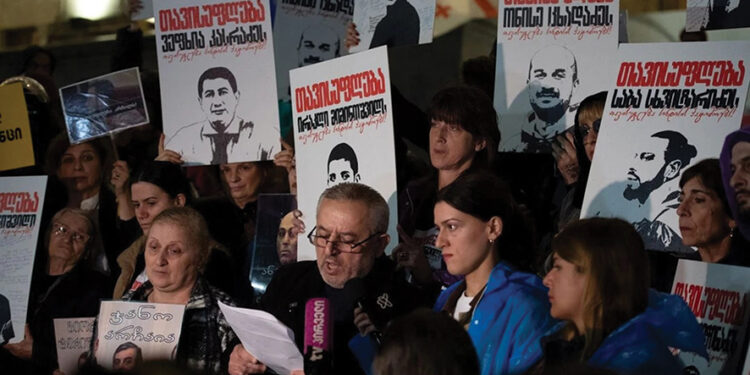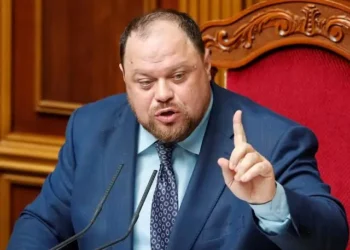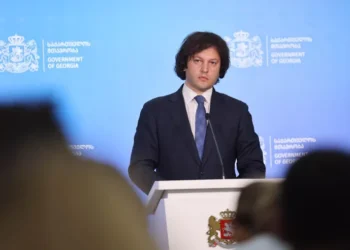Somewhere between the solemn hush of a courtroom and the subterranean hum of the Tbilisi metro, a new kind of transaction is taking shape in Georgia. It isn’t written into the criminal code, nor does it belong to any known judicial ritual. It slips through ecclesiastical robes and whispered conversations in holding cells. It is, simply put, an offer: say you’re sorry, admit you were wrong, and maybe—just maybe—we’ll let you go.
This is the reality facing a group of protesters detained during the anti-government demonstrations that gripped Tbilisi last winter, after the Georgian government announced the suspension of the country’s EU integration process. Their names—Andro Chichinadze, Onise Tsxadadze, Giorgi Terishvili, and others—may not yet be canonized in the national memory, but the ethical conundrum they now embody ought to resonate far beyond the steps of Rustaveli Avenue.
According to their own accounts, the detainees have been quietly approached, sometimes via clergy, sometimes through less identifiable intermediaries, with a conditional path to freedom. The formula is familiar to students of power: accept the charges, express contrition, and petition the president (or his surrogate) for a pardon. Perform guilt. Simulate remorse. Reenter society cleansed, if not of the actual crime, then of your civic disobedience. What’s being negotiated here is not guilt, but theater. And as anyone who has read Foucault, or lived under post-authoritarian regimes, can tell you, theater is never just theater.
The Soul as a Bureaucratic Object
In Discipline and Punish, Foucault writes that modern systems of justice are no longer content to punish the body. They seek instead to shape the soul. Georgia, a country still suspended between two gravitational pulls—the Western rule of law and the Eastern specter of performative justice—has become a kind of laboratory for the management of dissent. And in this instance, the soul becomes a bureaucratic object: its compliance is filed, stamped, and, if necessary, televised.
But this isn’t new. The 1937 Soviet show trials were masterclasses in this logic: grim pageants in which writers and engineers confessed, wept, begged for forgiveness, and were shot anyway. Their confessions weren’t meant to inform the state, but to sanctify it. They transformed political violence into moral necessity.
It’s not hard to hear echoes of this in the case of Georgian actor Andro Chichinadze, who said recently, “The same offer is being made to all of us. If I apologize, they say, I’ll be released.” His voice is weary, skeptical, but firm. “Let them offer pardon to the police who were running around Rustaveli.”
The Pardon as a Cultural Artifact
Let’s pause here and consider what a pardon really is. In American law, it’s a final act of mercy, ideally removed from politics. In Catholic doctrine, it’s a divine gift, a washing away of sin. But in Georgia, in 2025, it seems to have become something else: a state-sponsored performance of guilt, a page torn from the dramaturgy of post-Soviet shame.
To be pardoned in this context is not to be released from wrongdoing: it is to enter a narrative in which your wrongdoing is the axis around which legitimacy turns. And legitimacy, in a country suspended in geopolitical limbo, is precious.
The state’s offer of pardon—informal, unofficial, unofficially denied—is less a legal mechanism than a test of loyalty. It functions not unlike the kompromat dossiers used by Soviet intelligence, where private transgressions were held like IOUs against the conscience. In this case, the transgression is public, but the reckoning is private. You kneel, we let you stand.
Dignity as a Refusal
That’s why the protesters’ refusal feels so radical. It’s also why it feels so Georgian.
“This is a question of dignity,” said comedian and detainee Onise Tsxadadze. “I will not write to a man who decorated those who beat citizens in the streets.”
It’s a line worthy of an ancient Greek tragedy—where moral clarity arrives precisely when the protagonist chooses suffering over dishonor. But this isn’t Sophocles; it’s post-2024 Georgia, where liberal aspirations coexist uneasily with the baroque rituals of post-Soviet governance.
In many ways, Georgia is playing out its own variation on the script performed in Russia, Turkey, even Hungary: the slow reabsorption of dissent into a nationalist machine. But the difference lies in the protestors’ language—a blend of theatrical irony, bitter humor, and moral exactitude.
“Let them pardon the police,” Chichinadze said. “We have nothing to be sorry for.”
Who Gets to Forgive?
Pardon, after all, is a moral technology. But it depends on a tacit hierarchy: someone has the right to forgive, and someone must ask for it. The current Georgian case reveals how unstable this structure becomes when the moral superiority of the state is openly contested.
Sociologist Pierre Bourdieu called this symbolic violence: the quiet, near-invisible way in which power inscribes itself into what seems natural, even benevolent. The offer of pardon may feel like mercy, but in its context, it is coercion disguised as grace.
To say “no” is to refuse not just the terms of the offer, but the entire edifice upon which it rests.
The Silent Role of the Church
And what of the Church? The Georgian Orthodox Church, long revered for its role in preserving national identity through imperial and Soviet rule, now finds itself entangled in the soft mechanisms of power.
That the offer was reportedly relayed through clergy makes perfect sense—and perfect sense, too, is the protesters’ fury at this betrayal.
“Let the so-called Fathers remember who they serve,” said one detainee. “God, or something else entirely?”
It is a chilling question. It also points to the deeper crisis: not merely political, but metaphysical. When forgiveness becomes a currency of political manipulation, the soul—once the last refuge of the individual—becomes one more arena of statecraft.
Georgia at the Threshold
The detained protesters are, of course, individuals with different histories, professions, temperaments. One is an actor. Another, a stand-up comic. One was studying literature; another, law. What unites them is a shared refusal to play the part assigned to them in the state’s morality play. And so they sit, in pre-trial detention, waiting. Not for forgiveness. For recognition.
They are not heroes—at least not yet. But in their refusal to apologize, they remind us of something easily forgotten in times of institutional fatigue: that dignity, like sovereignty, is indivisible. Once you hand it over, it doesn’t come back.
The real danger, in moments like these, is the temptation to normalize the moral transaction. “It’s just a formality,” we tell ourselves. “Everyone does it.” But the moment dissent becomes an offense that must be repented for, the republic becomes a cathedral. And the president, whether elected or not, becomes its god. Georgia has been here before. It should not go back.
Op-Ed by Ivan Nechaev














